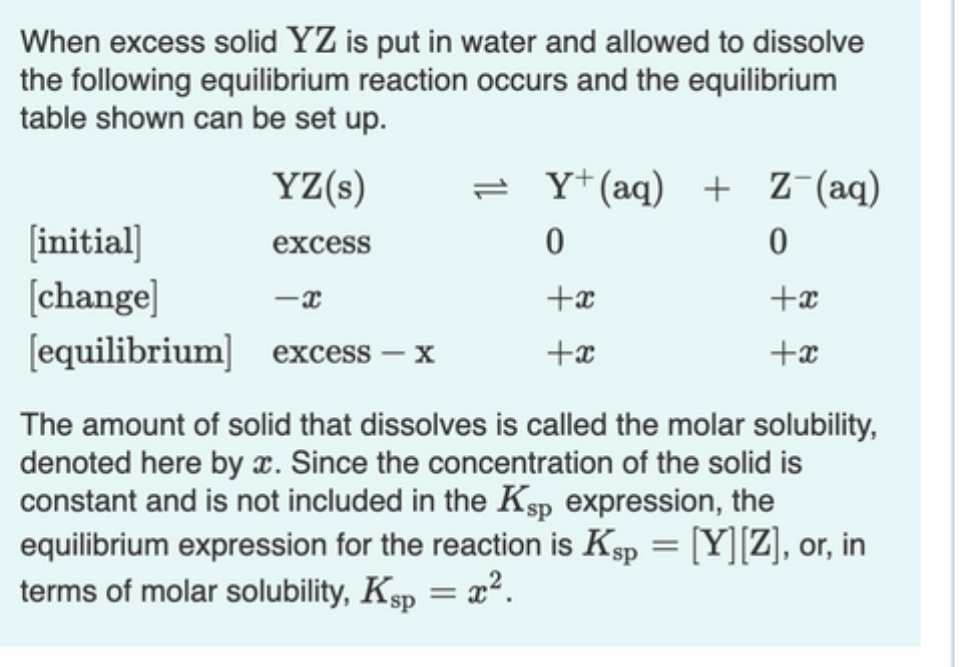When excess solid YZ is put in water and allowed to dissolve the following equilibrium reaction occurs and the equilibrium table shown can be set up. YZ(s) excess [initial] [change] -x [equilibrium] excess - x =Y+ (aq) + Z¯(aq) 0 0 +x +x +x +x The amount of solid that dissolves is called the molar solubility, denoted here by x. Since the concentration of the solid is constant and is not included in the Ksp expression, the equilibrium expression for the reaction is Ksp = [Y][Z], or, in terms of molar solubility, Ksp = x². Enter the Ksp expression for the solid AB₂ in terms of the molar solubility . Express your answer in terms of x. ► View Available Hint(s) Ksp = Submit 17 ΑΣΦ ?
When excess solid YZ is put in water and allowed to dissolve the following equilibrium reaction occurs and the equilibrium table shown can be set up. YZ(s) excess [initial] [change] -x [equilibrium] excess - x =Y+ (aq) + Z¯(aq) 0 0 +x +x +x +x The amount of solid that dissolves is called the molar solubility, denoted here by x. Since the concentration of the solid is constant and is not included in the Ksp expression, the equilibrium expression for the reaction is Ksp = [Y][Z], or, in terms of molar solubility, Ksp = x². Enter the Ksp expression for the solid AB₂ in terms of the molar solubility . Express your answer in terms of x. ► View Available Hint(s) Ksp = Submit 17 ΑΣΦ ?
Chemistry
10th Edition
ISBN:9781305957404
Author:Steven S. Zumdahl, Susan A. Zumdahl, Donald J. DeCoste
Publisher:Steven S. Zumdahl, Susan A. Zumdahl, Donald J. DeCoste
Chapter1: Chemical Foundations
Section: Chapter Questions
Problem 1RQ: Define and explain the differences between the following terms. a. law and theory b. theory and...
Related questions
Question
![When excess solid YZ is put in water and allowed to dissolve
the following equilibrium reaction occurs and the equilibrium
table shown can be set up.
YZ(s)
excess
[initial]
[change]
[equilibrium] excess X
-X
= Y+ (aq)
0
+x
+x
+ Z¯(aq)
0
+x
+x
The amount of solid that dissolves is called the molar solubility,
denoted here by x. Since the concentration of the solid is
constant and is not included in the Ksp expression, the
equilibrium expression for the reaction is Ksp = [Y][Z], or, in
terms of molar solubility, Ksp = x².
Enter the Ksp expression for the solid AB2 in terms of the molar solubility x.
Express your answer in terms of x.
► View Available Hint(s)
Ksp
Submit
——| ΑΣΦ
?](/v2/_next/image?url=https%3A%2F%2Fcontent.bartleby.com%2Fqna-images%2Fquestion%2F3caf0467-ca0e-4770-b0d8-25bdaac915d0%2Fcf5e30ec-36fe-48aa-8dac-efe5e4a4e3da%2Fkhwhahk_processed.png&w=3840&q=75)
Transcribed Image Text:When excess solid YZ is put in water and allowed to dissolve
the following equilibrium reaction occurs and the equilibrium
table shown can be set up.
YZ(s)
excess
[initial]
[change]
[equilibrium] excess X
-X
= Y+ (aq)
0
+x
+x
+ Z¯(aq)
0
+x
+x
The amount of solid that dissolves is called the molar solubility,
denoted here by x. Since the concentration of the solid is
constant and is not included in the Ksp expression, the
equilibrium expression for the reaction is Ksp = [Y][Z], or, in
terms of molar solubility, Ksp = x².
Enter the Ksp expression for the solid AB2 in terms of the molar solubility x.
Express your answer in terms of x.
► View Available Hint(s)
Ksp
Submit
——| ΑΣΦ
?

Transcribed Image Text:Enter the the Ksp expression for C2D3 in terms of the molar solubility .
Express your answer in terms of x.
► View Available Hint(s)
Ksp
=
Submit
——| ΑΣΦ
?
Expert Solution
Step 1
Given that,

We need to write Ksp expressions for solid AB2 and solid C2D3 interms of molar solubility x
Trending now
This is a popular solution!
Step by step
Solved in 3 steps with 1 images

Knowledge Booster
Learn more about
Need a deep-dive on the concept behind this application? Look no further. Learn more about this topic, chemistry and related others by exploring similar questions and additional content below.Recommended textbooks for you

Chemistry
Chemistry
ISBN:
9781305957404
Author:
Steven S. Zumdahl, Susan A. Zumdahl, Donald J. DeCoste
Publisher:
Cengage Learning

Chemistry
Chemistry
ISBN:
9781259911156
Author:
Raymond Chang Dr., Jason Overby Professor
Publisher:
McGraw-Hill Education

Principles of Instrumental Analysis
Chemistry
ISBN:
9781305577213
Author:
Douglas A. Skoog, F. James Holler, Stanley R. Crouch
Publisher:
Cengage Learning

Chemistry
Chemistry
ISBN:
9781305957404
Author:
Steven S. Zumdahl, Susan A. Zumdahl, Donald J. DeCoste
Publisher:
Cengage Learning

Chemistry
Chemistry
ISBN:
9781259911156
Author:
Raymond Chang Dr., Jason Overby Professor
Publisher:
McGraw-Hill Education

Principles of Instrumental Analysis
Chemistry
ISBN:
9781305577213
Author:
Douglas A. Skoog, F. James Holler, Stanley R. Crouch
Publisher:
Cengage Learning

Organic Chemistry
Chemistry
ISBN:
9780078021558
Author:
Janice Gorzynski Smith Dr.
Publisher:
McGraw-Hill Education

Chemistry: Principles and Reactions
Chemistry
ISBN:
9781305079373
Author:
William L. Masterton, Cecile N. Hurley
Publisher:
Cengage Learning

Elementary Principles of Chemical Processes, Bind…
Chemistry
ISBN:
9781118431221
Author:
Richard M. Felder, Ronald W. Rousseau, Lisa G. Bullard
Publisher:
WILEY